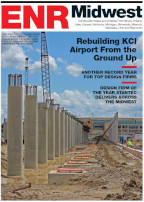As for aviation, the Asia-Pacific region is expected to be the most profitable in the global air-transport market. Vietnam is projected to be the world’s third fastest-growing market for international passengers and freight and, by 2014, the second fastest-growing market for domestic passengers as a result of the growing middle class and an upsurge in tourism.
The money is there. The resources and knowledge capacity are what is required, which is where U.S. businesses have a point of entry.
Gossack: Participants that will get the most out of the mission are those that have experience in infrastructure development in mid-level developing countries such as Indonesia and are able to provide services, technology, pricing and human resources appropriate for such an environment. While Indonesia has a wide range of infrastructure needs, the top sectors are energy, aviation, water and environmental technologies, ports and architecture-construction-engineering. For example, Indonesia has seen its energy demand grow between 7% to 9% per year over the last five years. Meanwhile, it has suffered significant energy shortages, and the electrification rate is around 70%, one of the lowest in the region. So, there are many opportunities for U.S. companies in become involved in power generation projects, ranging from mini-hydro to renewable energy to more traditional powerplants.
Because Indonesia extends over an archipelago of 17,000 islands the width of the U.S., the country presents a huge aviation opportunity and one of the fastest-growing domestic air traffic markets in the world. It currently has 25 airport projects planned for upgrade and expansion by 2014. Over the next decade, two new green-field airports as well as expansions and upgrades of another 45 smaller, Directorate General of Civil Aviation-run airports are planned. Over the next four years, the Indonesian Ministry of Transportation estimates project spending needs at $3.5 billion. Significant opportunities also exist in aviation subsectors such as airport planning and design, ground support and equipment, and logistical infrastructure. Over 350 projects are part of an initiative, the Master Plan for the Acceleration and Expansion of Indonesian Economic Development (MP3EI), which is being spearheaded by Indonesia President Susilo Bambang Yudhoyono. MP3EI contains nationwide project proposals outlining economic development for the next 15 years in Indonesia.
Can you describe the business environment in Indonesia and Vietnam? What are some challenges U.S. businesses can expect?
Kemp: I am going to be frank when I say there are some challenges to doing business in Vietnam. The regulatory regime, infrastructure and bureaucratic administrative processes all exist in a form that is quite unlike what we experience in the U.S., and that takes some getting used to. But the country is also rife with opportunity—it is what we call a true emerging market. The World Bank currently ranks Vietnam as the most attractive place for investment in Southeast Asia and among the top 10 emerging markets in the world. U.S. businesses looking to enter Vietnam will need to be prepared to do their due diligence, but the opportunities are certainly available.
Gossack: Indonesia shares many of the same challenges as Vietnam, and I would add that regional competition—from countries such as China, Japan and Korea—is intense. But I would also echo the sentiment about the wide availability of business prospects for U.S. companies, which are respected for their advanced products and technology, business acumen, and professional integrity in management and operations. In terms of the markets, both countries have large populations—though Indonesia’s population is almost three times the size of Vietnam—with more than 50% of the population under 30 years old in each country. Compare those figures to other countries with dwindling or rapidly aging populations and you can see a picture of two youth-driven markets that have the potential to grow for some time.
Can you offer our readers some tips for doing business in Indonesia and Vietnam?
Kemp: As I mentioned before, doing your due diligence is the best advice for operating in Vietnam. This is not a reflection on the Vietnamese themselves, but more the fact that the legal and arbitration processes are difficult to navigate for foreigners. So, it is best to spend extra time and care choosing a reliable and compatible business partner. It will be a very worthwhile investment, and it is something we can help businesses with at the U.S. Commercial Service.
Gossack: Personal relationships are very important, sometimes more highly valued than even price and quality, so be prepared to spend some time with your clients before settling the business transaction and be prepared to be a regular visitor there. If you consciously make an effort to follow Indonesian customs, you will be well received, though the business community there is familiar with American business customs. Like anywhere, you need to exercise great care in selecting your partner and making sure to do your due diligence to ensure the best match of business goals, capabilities and expectations.


